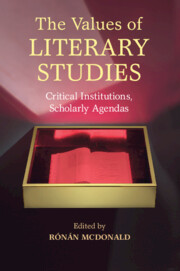Book contents
- Frontmatter
- Contents
- Notes on Contributors
- Acknowledgments
- Introduction
- 1 The Value of Criticism and the Project of Modernism
- 2 Caprice: Individual Subjectivity in Literary Criticism
- 3 The Phenomenology of Literary Valuation
- 4 Literature Is History: Aesthetic Time and the Ethics of Literary Will
- 5 Dead on Arrival: Time and the Value of Old Books
- 6 The Price of Value
- 7 To Shelter the Nothing That Happens
- 8 When Literary Criticism Mattered
- 9 Literature among the Objects of Modernist Criticism: Value, Medium, Genre
- 10 “Vale!” : Psychoanalysis, Value, and Literature
- 11 Afterlives of Comparison: Literature, Equivalence, Value
- 12 Feminism, Gender, and the Literary Commons
- 13 The Value of World Making in Global Literary Studies
- 14 Multiple Versions and Fictional Minds: Manuscript Research, Digital Editing, and Enactive Cognition in Literary Studies
- 15 After Suspicion: Surface, Method, Value
- 16 Literary Experience and the Value of Criticism
- Index
9 - Literature among the Objects of Modernist Criticism: Value, Medium, Genre
Published online by Cambridge University Press: 05 November 2015
- Frontmatter
- Contents
- Notes on Contributors
- Acknowledgments
- Introduction
- 1 The Value of Criticism and the Project of Modernism
- 2 Caprice: Individual Subjectivity in Literary Criticism
- 3 The Phenomenology of Literary Valuation
- 4 Literature Is History: Aesthetic Time and the Ethics of Literary Will
- 5 Dead on Arrival: Time and the Value of Old Books
- 6 The Price of Value
- 7 To Shelter the Nothing That Happens
- 8 When Literary Criticism Mattered
- 9 Literature among the Objects of Modernist Criticism: Value, Medium, Genre
- 10 “Vale!” : Psychoanalysis, Value, and Literature
- 11 Afterlives of Comparison: Literature, Equivalence, Value
- 12 Feminism, Gender, and the Literary Commons
- 13 The Value of World Making in Global Literary Studies
- 14 Multiple Versions and Fictional Minds: Manuscript Research, Digital Editing, and Enactive Cognition in Literary Studies
- 15 After Suspicion: Surface, Method, Value
- 16 Literary Experience and the Value of Criticism
- Index
Summary
My aim in this essay is to investigate approaches to the question of aesthetic value that postulate a specific medium for a given art practice. The criterion of “medium specificity,” as it has come to be called, has had a somewhat less obvious relation to poetics and literary criticism than in the case of many other arts. It came of age in and for modernism, but if you consult William K. Wimsatt and Cleanth Brooks's two-volume Literary Criticism: A Short History (1957), produced in the heyday of modernism's literary-critical movement, the New Criticism, you will see that its index has entries for marvelous, materialism, medievalism, metaphor, meter, mimesis, morality, music, and myth, but not for medium. An explicit contemporary declaration of how medium matters to literary value, however, can be found in a recent essay by the prominent American L=A=N=G=U=A=G=E poet Charles Bernstein, with its high praise of critics he calls “technoformalist.” What impresses Bernstein about these critics, from across a range of fields, is not only that they “draw attention to what it means to work within a medium, but also that they acknowledge the value of using a medium to do only what can be done in that medium.” Here is how he spells out the gains for poetics: “While humanist literary criticism naturalizes the medium of the art, just as it neutralizes its ideology, technoformalist criticism recognizes the medium (and by extension ideology) to have qualities of its own that some art within this medium will choose to foreground, which is to say, bring to consciousness.” Value clearly operates here on two levels, that of a judgment about criticism (one mode is better because it can acknowledge the value inherent in an art's respect for its medium specificity) and that of a judgment about actual literary works. And Bernstein rightly draws a connection between such judgments of value and the movement we call modernism: “In poetry, this approach is at the heart of radical modernism [sic] composition, with its focus not only on what is conveyed, but also on the specific conditions of the conveyance.”
In spite of Bernstein's mention of modernism “[i]n poetry,” the modernist paradigm for the theory of medium specificity probably derives from those arts – visual and plastic – to which the idea of a medium seems to belong most naturally.
- Type
- Chapter
- Information
- The Values of Literary StudiesCritical Institutions, Scholarly Agendas, pp. 137 - 154Publisher: Cambridge University PressPrint publication year: 2015
- 1
- Cited by

